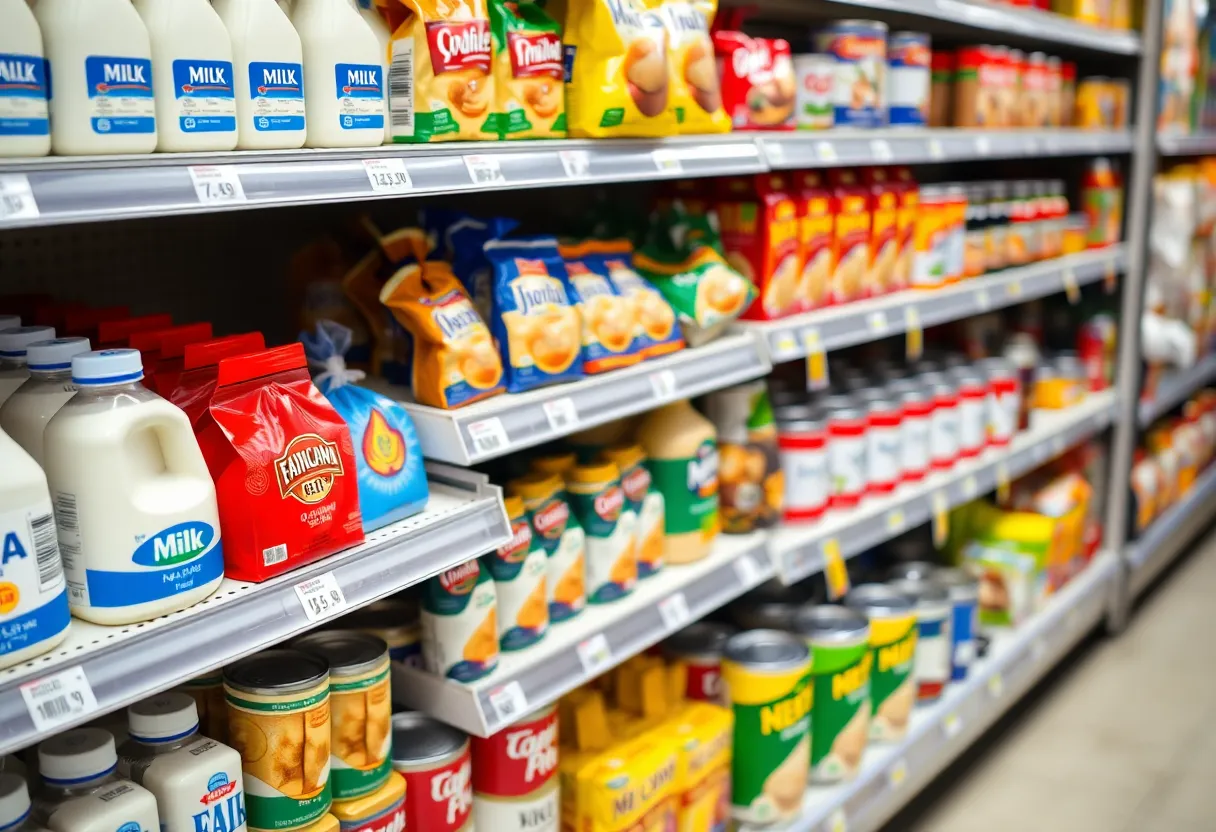Louisville, October 14, 2025
Louisville residents are increasingly turning to store brands as grocery prices soar, with a reported 20% increase in private label purchases over the past year. This trend is largely driven by the need for affordable alternatives to traditional name-brand products. Expert advice suggests comparing labels for quality, and many families are sharing tips on social media to navigate these economic challenges. The shift reflects a broader response to inflation and supply chain disruptions, fostering a community effort to seek savings while maintaining essential needs.
Louisville Shoppers Shift to Store Brands Amid Soaring Grocery Prices
Louisville residents are increasingly relying on store brands to combat climbing grocery prices, with private label purchases surging by 20% over the past year. This shift reflects broader economic pressures, as families seek affordable alternatives to name-brand staples like milk and bread. Consumer data highlights the trend’s momentum, showing how everyday shoppers are adapting to persistent inflation without sacrificing essential needs.
Why Shoppers Are Turning to Generics
The rise in store brand adoption stems from unrelenting grocery price increases, driven by factors like supply chain disruptions and higher production costs. In Louisville, households report noticeable savings by choosing private labels, which often cost 25% to 30% less than their branded counterparts. Staples such as milk, bread, and canned goods lead the category, with many shoppers stocking up on these items during routine trips to local supermarkets.
National grocery chains with a strong presence in the area are responding by expanding their generic offerings. This includes introducing new private label lines for everything from fresh produce to household essentials. The strategy helps retailers retain customers squeezed by budget constraints, while also fostering competition that could eventually pressure name brands to adjust pricing. For Louisville families, this means more options on shelves that deliver value without compromising on variety.
Quality and Practical Tips for Consumers
Experts emphasize that store brands frequently match or exceed the quality of name brands, thanks to rigorous testing and comparable ingredients. Shoppers are encouraged to compare labels carefully—checking nutritional information, expiration dates, and packaging details—to ensure they meet personal standards. This approach not only maximizes savings but also builds confidence in generic products as reliable everyday choices.
Local economists project that supply chain issues will keep grocery costs elevated through 2026, potentially exacerbating the trend toward private labels. To navigate this, many residents are turning to practical strategies like bulk buying non-perishables and enrolling in loyalty programs. These tools offer additional discounts, points for future purchases, and exclusive deals on store-brand items, helping stretch household budgets further.
The Community Aspect of Thriftiness
Beyond individual actions, Louisville‘s response to economic pressures has sparked a community-wide movement. Social media platforms buzz with shared tips on scoring deals, recipe ideas using affordable generics, and stories of successful switches to private labels. This collective effort transforms necessity into a shared experience, where residents exchange advice on everything from the best times to shop to homemade alternatives for pricier items. The online conversations underscore a sense of solidarity, as families support one another in maintaining financial stability amid rising expenses.
Broader Economic Context
The 20% rise in private label purchases aligns with national patterns but feels particularly acute in Louisville, where the cost of living has ticked upward alongside regional inflation rates. Grocery expenses, which account for a significant portion of monthly budgets, have become a focal point for cost-conscious consumers. While some categories like fresh fruits and vegetables see slower adoption of generics due to quality concerns, the overall pivot to store brands signals a long-term behavioral change.
Retailers in the area continue to monitor these shifts, adjusting inventory to prioritize high-demand private label products. This evolution benefits both shoppers seeking relief and businesses aiming to sustain foot traffic. As ongoing supply chain issues persist, the reliance on store brands is expected to deepen, potentially influencing how grocers operate in the coming years. For now, Louisville residents demonstrate resilience, turning economic challenges into opportunities for smarter spending.
In summary, the surge in store brand usage reflects a practical response to grocery prices that show no signs of abating soon. By embracing generics, participating in loyalty programs, and sharing community insights, Louisville shoppers are not just surviving inflation—they’re adapting proactively to protect their finances.
FAQ
What is driving the increase in store brand purchases in Louisville?
Grocery prices continue to climb, prompting Louisville shoppers to increasingly turn to store brands for savings. Consumer reports show a 20% rise in private label purchases over the past year, with staples like milk and bread leading the trend.
How are national chains responding to this trend?
National chains in the area are expanding their generic lines to compete with inflation-driven budgets.
What advice do experts give for choosing store brands?
Experts advise comparing labels, as many store brands match or exceed name-brand quality.
What do local economists say about future grocery costs?
Local economists warn that ongoing supply chain issues could sustain high costs into 2026, encouraging bulk buying and loyalty programs.
How is the community in Louisville engaging with this issue?
Residents share tips on social media, turning thriftiness into a community movement amid economic pressures.
Key Trends in Louisville Grocery Shopping
| Trend | Description | Impact |
|---|---|---|
| Store Brand Adoption | 20% rise in private label purchases over the past year | Savings on staples like milk and bread |
| National Chain Expansion | Expanding generic lines to compete with inflation | More affordable options available locally |
| Expert Advice | Compare labels for quality matching name brands | Builds consumer confidence in generics |
| Future Cost Outlook | Ongoing supply chain issues sustaining high costs into 2026 | Encourages bulk buying and loyalty programs |
| Community Movement | Residents sharing tips on social media | Fosters thriftiness amid economic pressures |
Deeper Dive: News & Info About This Topic
HERE Resources
Sears Store Closure at Jefferson Mall Affects Louisville Retail Sector





